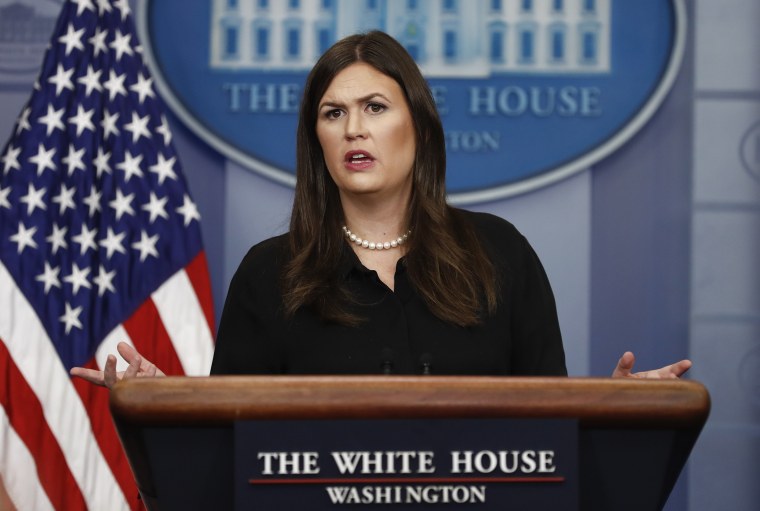During an impromptu Q&A with reporters late yesterday, Donald Trump once again insisted there was "no collusion" between his campaign and his Russian benefactors. The phrase seems to have become something of a nervous tic for the president, which he repeats almost uncontrollably.
But towards the end of his chat last night, a reporter asked, "How do you define collusion?" Trump replied, "You're going to define it for me, OK? But I can tell you, there's no collusion."
It was an odd response, which suggested the president doesn't know what collusion is, but he's sure he didn't do it.
The exchange followed a similar back and forth during yesterday's briefing with White House Press Secretary Sarah Huckabee Sanders.
REPORTER: The president has said repeatedly there was no collusion between the campaign and Russia. Can you define what he means when he says 'collusion'? Is he talking about meetings between officials? Is he talking about information-exchanging hands? What does that mean?SANDERS: Look, I think the accusation against the president is that he had help winning the election, and that's simply untrue. The president won because he was the better candidate, because he worked harder, because he had a message that America actually cared about and believed in, and came out in a historic fashion and supported and voted for him.
For now, let's put aside the odd campaign-related boasts -- if Trump were really such a tremendous candidate, he probably wouldn't have lost the popular vote by nearly 3 million ballots -- and focus on the substance of Sanders' answer.
"I think the accusation against the president is that he had help winning the election, and that's simply untrue." But is it? Trump had help from Russia, he knew he had help from Russia, he publicly asked for help from Russia, at times he even celebrated the help he received from Russia while it was happening.
In context, I'm not sure Sanders was really trying to answer the question yesterday, but if she was, she apparently set the "collusion" bar at a level the White House may find troubling.
The fact remains that "collusion" is far more of a political term than a legal one, so Trump World's preoccupation with the word -- and its reluctance to define it -- isn't especially helpful.
That said, I often find myself thinking about something House Intelligence Committee Ranking Member Adam Schiff (D-Calif.) said several weeks ago: "The Russians offered help. The campaign accepted help. The Russians gave help. And the president made full use of that help."
Brian Beutler had a related piece around the same time.
We know that Russian spies approached the Trump campaign offering assistance in the election multiple times. At least twice, Russians dangled the lure of “dirt” on Hillary Clinton, including stolen emails, and both times, Trump campaign officials (George Papadopoulos and Donald Trump, Jr.) expressed interest. Trump, Jr. was particularly enthusiastic about the idea of cooperating with the Russians, and shortly after he welcomed Russian spies to Trump tower for a meeting about “dirt” on Hillary Clinton, he coordinated messaging with Wikileaks, which operated last summer and fall as a cutout for Russian hackers.After repeatedly communicating to Russia (in public and in private) that they welcomed interference in the election, Trump and his aides cast public doubt on whether the saboteurs were Russians at all. When Trump went on to win the election after benefiting from this interference, members of his inner circle, through Michael Flynn, secretly connived with Russia to subvert the countermeasures the American government had undertaken as penalties for Russia’s interference.
This, of course, is based on what we know right now. More information continues to come to light all of the time.
As we discussed last month, there's ample room for debate about whether the cooperation between Trump World and Russia reached a criminal level, and whether the frequent and numerous communications between people close to Trump and Russians – contacts that the president and his team repeatedly lied about for reasons they haven’t explained – were illegal.
But for the White House to continue to describe the scandal as “a hoax” -- as Sarah Huckabee Sanders did again yesterday -- is little more than an insult to Americans’ intelligence.
